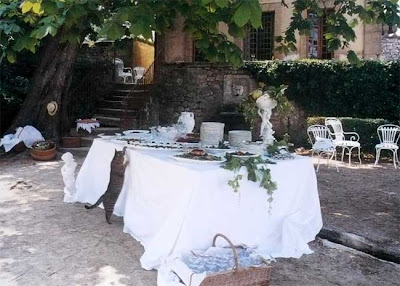A bed stripped to its essentials: this is minimalism.

The dream of the eternal virgin.... (so clean that men are prohibited).
 A well made contemporary version of the traditional bed, sometimes known as a "lit bateau," or boat bed.
A well made contemporary version of the traditional bed, sometimes known as a "lit bateau," or boat bed.
 A beautiful art nouveau bed designed by Louis Majorelle in 1902.
A beautiful art nouveau bed designed by Louis Majorelle in 1902.
Known as "le lit nenuphar," or the waterlily bed.
The bolster pillow is oh so typically French!
What's a beautiful bed without comfortable linens...
hand embroidered pure linen sheets, simply the best of the best.
(and anti-allergenic and 100% organic to boot! )
 An extravangant 19th century bed (Musée des Arts Décoratifs, Paris)
An extravangant 19th century bed (Musée des Arts Décoratifs, Paris) A 20th century romantic version of a "lit à la polonnaise." The curtains are made of a modern printed toile inspired by "toile de Jouy" in harmony with the wall paper.
A 20th century romantic version of a "lit à la polonnaise." The curtains are made of a modern printed toile inspired by "toile de Jouy" in harmony with the wall paper.

An American four poster bed

In the middle ages individual sleeping rooms were non-existent. More often than not, even the bed was shared by several people. If by chance you’ve read Tristan and Iseult you may remember that Tristan slept in the same room as the king and his wife. Surrounding a bed with curtains was a way to not only protect from the cold but to insure a bit of intimacy as well. This kind of decoration later evolved into a sign of stature.


A rustic 19th century canopy bed.
 .Bed " Lit à la polonnaise" with a round fabric dome ,and elaborate upholstery details.King Georges IV of England acquired such a bed for his private residence Carlton House in the 1780s
.Bed " Lit à la polonnaise" with a round fabric dome ,and elaborate upholstery details.King Georges IV of England acquired such a bed for his private residence Carlton House in the 1780s Four French rustic beds 18th and 19th century.
Four French rustic beds 18th and 19th century.
 A huge white banquet damask tablecloth that falls to the floor. This is a throwback to the ancient past when the tablecloth was used as a napkin to clean one's fingers (as most of the time people did not use forks!!!). Some antique damask tablecloths are real works of art and priced accordingly.
A huge white banquet damask tablecloth that falls to the floor. This is a throwback to the ancient past when the tablecloth was used as a napkin to clean one's fingers (as most of the time people did not use forks!!!). Some antique damask tablecloths are real works of art and priced accordingly. One should always set a table with a minimum of two glasses, the water glass on the left and the wine glass on its right. When there is red and white wine the white wine glass should be positioned at the far right.
One should always set a table with a minimum of two glasses, the water glass on the left and the wine glass on its right. When there is red and white wine the white wine glass should be positioned at the far right. However it is altogether appropriate to have a formal service with an elegant but short tablecloth. And all the better for a woman to show off her legs.
However it is altogether appropriate to have a formal service with an elegant but short tablecloth. And all the better for a woman to show off her legs.  Of course it's always possible to have the best of both worlds, a formal service with a tablecloth that reaches the floor and a shorter cloth placed on top to the best effect. This one for example has elaborate embroidery which is set off by the colored cloth underneath.
Of course it's always possible to have the best of both worlds, a formal service with a tablecloth that reaches the floor and a shorter cloth placed on top to the best effect. This one for example has elaborate embroidery which is set off by the colored cloth underneath.

























































